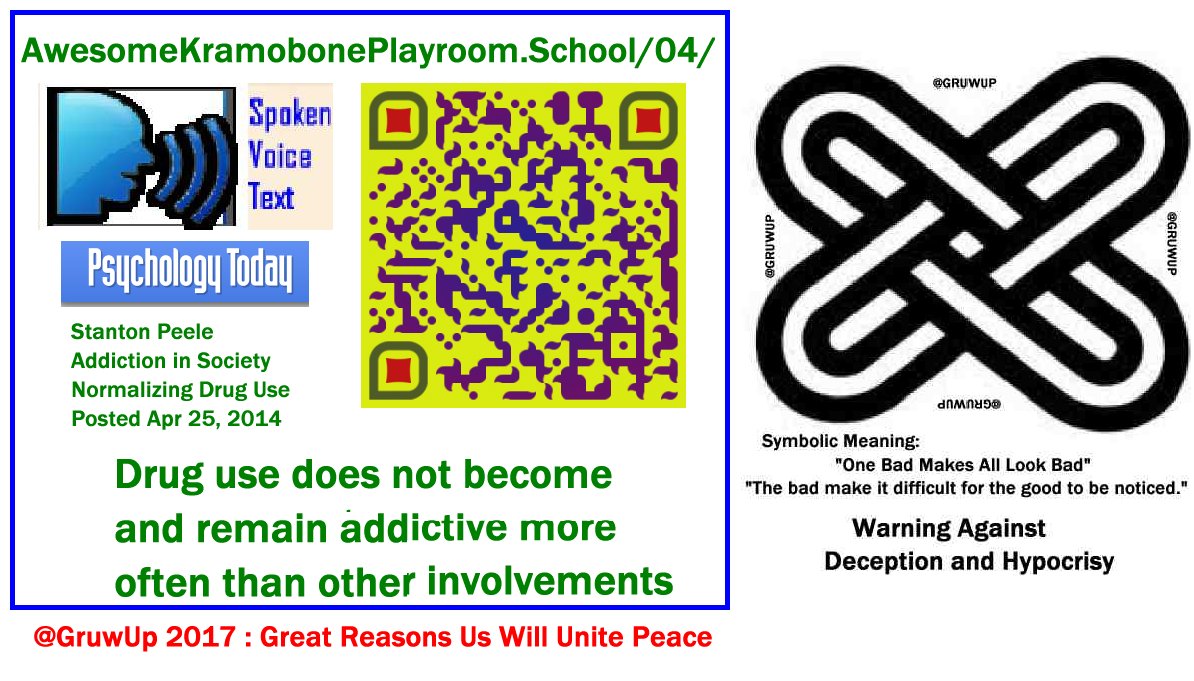
Stanton Peele
Addiction in Society
Normalizing Drug Use
Drug use does not become and remain addictive more often than other involvements
Posted Apr 25, 2014
---------- [ Cited Quoted Excerpts ]------
The drug policy battle in the U.S. isn't about medical marijuana, or even legalizing marijuana. It's about normalizing drug use. Do drugs create different experiences from other involvements we are familiar with—are they more compelling, more inescapable, less controllable, more inexorable in their progression to addiction than other experiences that we encounter daily? They are not. By and large, people don't accept Bruce's, Carl's, and my idea that drug responses fall in the range of normal human experiences, or my idea of the equivalency of drug and behavioral addictions (which is now the American Psychiatric Association's official position). (Please don't answer, "You don't mean physiologically addictive." See The Meaning of Addiction.) Americans carry too much cultural baggage to allow those ideas in. Instead, we think drugs—especially narcotics, and most especially heroin, followed by cocaine, crack and meth—are "truly" addictive. So what? Maia goes on to cite statistics from the 2012 National Survey of Drug Use and Health, in which fewer than one percent of Americans have a serious marijuana problem, although 48 percent have used marijuana in their lives. Why, that's less than two percent of everyone who has ever used the drug who abuse or are addicted to the substance currently. That is so unlike dangerous drugs to which everyone rapidly becomes permanently addicted! Not exactly. Here are the lifetime use figures for heroin (2.6 percent), cocaine (18 percent), crack (5 percent), and meth (6 percent): Here are the current abusers/addicts with these drugs: heroin (0.1 percent), cocaine (0.4 percent), crack (not listed), meth (only stimulants listed = 0.2 percent). So, for heroin, that's four percent of ever users who are addicted, and for cocaine about the same as for marijuana (around 2 percent). While meth and crack can't be calculated, the figure is clearly a small minority (less than 10 percent). What are we to make of that? According to government surveys, people rarely find even the most addictive, dangerous drugs to be, well, addictive and dangerous. Please don't answer, "People don't tell the truth in government surveys." In their comprehensive follow-up of Vietnam vets addicted to heroin in Asia, Lee Robins and her colleagues found that users of heroin stateside were no more likely to consume that drug compulsively than were users of other illicit drugs. Based on this and other research, I said in The Meaning of Addiction, "heroin does not appear to differ significantly in the potential range of its use from other types of involvements, and even compulsive users cannot be distinguished from those given to other habitual involvements in the ease with which they desist or shift their patterns of use."